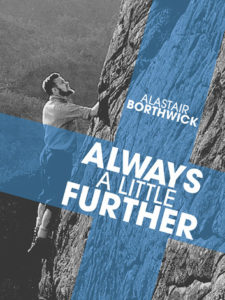Alastair Borthwick (17 February 1913 – 25 September 2003) was a man who had many passions. First of all, he was a passionate author, best remembered for the book he almost never published. Borthwick was also passionate about climbing in the highlands of Scotland, but he also captured the grimness of war in the most graphic terms.
More middle class than most, Alastair Borthwick made friends with tramps, berry pickers and other common folks in an era of great social changes. He was a simple man with simple goals. “I always believed the ideal life was to write a thousand words in the morning and catch a salmon in the afternoon,” Alastair Borthwick once said.
Besides being a seasoned author, Alastair Borthwick was also a distinguished journalist, a broadcaster, a war historian and an organizer of national exhibitions. Alastair was the king of more than just one genre. His first literary success, Always A Little Further (1939), is described as a vivid memoir of carefree times of wandering through the amazing Scottish highlands. His second novel, the equally vivid Sans Peur (1946), changed his literary focus to the last years of Second World War. Sans Peur was later reissued in the 1980s and 1990s as Battalion, which brought Alastair Borthwick to the second wave of acclaim, especially overseas.
From nature to war and then again back to nature, Alastair always believed in going a little further. It would be extremely difficult to describe his life in one piece, but here is something that we should all know about this great author who painted some of the most turbulent times for us and generations to come.
Always A Little Further
 Always A Little Further is Alastair Borthwick’s classic book based on Scottish mountain adventures. The title was originally taken from Flecker’s poem “Hassan,” and it quickly became a kind of fresh-air classic that still has a cult following. It is special because it was written and published in an era when most climbing and mountaineering literature focused on far and exotic places and experiences created by the rich and famous.
Always A Little Further is Alastair Borthwick’s classic book based on Scottish mountain adventures. The title was originally taken from Flecker’s poem “Hassan,” and it quickly became a kind of fresh-air classic that still has a cult following. It is special because it was written and published in an era when most climbing and mountaineering literature focused on far and exotic places and experiences created by the rich and famous.
Borthwick’s classic tale of camping and outdoor adventures was published in 1939, and it was clear from the start that it vividly captured the beginning of the “grass-roots” movement in the Scottish hills. Unlike the other books on the similar topics of that time, Always A Little Further was based on what working-class and the unemployed of Glasgow and Clydebank loved and experienced.
This was the time when a wave of enthusiasm for hiking and climbing had spread across northern Europe by the early 1930s. This newly established culture was originally inspired by the Wandervogel movement that blossomed in Germany’s Weimar Republic, which ultimately resulted in the establishment of national youth hostels associations. For those who don’t know, Weimar Republic is an unofficial historical designation for the German state from 1918 to 1933.
In Scotland, this movement was also heavily influenced by the mass unemployment in the Clydebank shipyards. Many men and women had a lot of time on their hands all of a sudden, and with mountains on their doorstep and very little money in their pockets, they all chose outdoor activities. Borthwick once noted: “One cannot sweat and worry simultaneously. The mountain resolves itself into a series of simple problems, unconfused by other issues. Its problems are solid rock, to be wrestled with physically; and in the sheer exuberance of thinking through his fingers and toes as his primaeval fathers did before him the climber’s worries vanish, sweated from his system, leaving his brain free to appreciate beauty.”
They hiked north in large groups to camp, climb and walk the West Highlands. Ken Wilson, the mountaineering historian, once described this phenomenon as, “It was rather as if a group of Eastenders had suddenly decided to take up grouse-shooting or polo.”
Other writers and authors of the period such as W.H. Murray and J.H.B. Bell wrote about the other types of mountaineering activities and focused on the climbing and hiking itself. On the other hand, Alastair Borthwick described the personalities among the new type of an impoverished, egalitarian climber, instead of the élite that was present in other books of the time. Instead, Alastair was more interested in common folks and their everyday problems and hiking preferences.
Besides the fact that people were able to identify themselves with his literature, Always A Little Further was also a valuable document that portrayed a period of big social changes. Another great thing about this book is Alastair’s entertaining and humorous style and certain joie de vivre that made it much more valuable to its readers.
In his book, Alastair Borthwick described encounters with tramps, Irish travelers and traders, and funny hitchhiking events, such as a journey to Ben Nevis in the back of a truck with a flock of dead sheep! Most of the climbers mentioned in these adventures are now dead, including Alex (Sandy) Mackendrick, who later became a film director of classics such as The Maggie, Whisky Galore, and High Wind in Jamaica. The cheerful Hamish Hamilton passed away in 1991 and he is still a famous figure in the mountaineering circles. Also, the character “John” was actually Boyd Anderson, who later became a minister and “Hugh,” the bank employee, was Stanley Knowles, who became a real-life banker. All of this made the book a classic of its genre and a powerful advocate for outdoor freedoms when all the other were denied.
And speaking of adventure, Always A Little Further was almost never published; when Alastair offered the manuscript to Faber and Faber, they initially declined it because they were unsure of the unusual subject. Luckily for Borthwick, T.S. Eliot was one of the directors at the time and he was the one who insisted on its publication. Always A Little Further has never been out of print since.
Alastair Borthwick Was a Man of Many Talents
Borthwick was born in Rutherglen, Lanarkshire in 1913. He was brought up in Troon, Ayrshire, and moved to Glasgow at the age of 11, where he went to high school. At only 16, Borthwick became a “telephone boy” at the Glasgow Evening Herald where his main job was writing down interviews with his correspondents.
However, Alastair soon moved on to a busier role at the Herald, which was a publication that employed only five people to fill twenty-eight pages. The seasoned author was obviously talented for many things, so he was soon promoted to writer and editor of the Women’s Page, Children’s Page, Film Reviews, Readers’ Letters and Readers’ Queries, and Crossword Compiler! Borthwick was also a regular contributor to the front page.
One of the most significant moments of his career at the Glasgow Evening Herald happened when he was invited to be a part of the paper’s “Open Air Page.” As a result of his involvement in this project, Alastair Borthwick discovered his love for outdoor recreation activities, and his passion for rock climbing. “I became an addict,” he remembered. “Most of my experiences ended up in the paper and I later used most of this material to write Always a Little Further.”
But life is full of obstacles, even for talented and ambitious people like Alastair Borthwick. In 1935, Borthwick got a job as a reporter at the Daily Mirror, but only a year later he got fired. Although discouraged at first, this proved to be a blessing, as he finally realized what he really wanted. Alastair moved into an area that was more suitable for his informality and easy-going character, and that was radio broadcasting.
Back in 1934, Alastair was interviewed at the BBC, when he casually mentioned to the producer James Fergusson how much he loved climbing. In fact, he had been climbing the weekend before his interview! Fergusson was intrigued. Was there something more about this hobby that people would love to hear about? Soon, James commissioned a 15-minute radio talk on this subject, and this was the moment when Borthwick revealed another talent of his – broadcasting. “I saw him in the studio treating the microphone like an old friend, chatting away, waving his arms about, and I knew this was how it was done,” said Fergusson admiringly.
Some people would use these talents to make a fortune and it would even make them overconfident, but this was not the case with Borthwick. Alastair was modest about his ability to sound casual and friendly in an era of formality. For him, this wasn’t even a talent, it was his life, “It just seemed the natural way to speak,” he said. “I couldn’t understand why everybody didn’t do it.” This was only the beginning and obviously, a lifelong career for Alastair. His first broadcast was in 1934 and his last in 1995.
The list of Borthwick’s jobs doesn’t end here; other interesting roles include running the Press Club for the 1938 Empire Exhibition, during which he was even required to perform from the top of the Exhibition Tower during a rainstorm while wearing a top hat and morning coat!
However, his most exciting and demanding employment arrived during the Second World War. As an Intelligence Officer assigned to the 5th Seaforth Highlanders, Alastair got to see more action than most.
Second World War

Alastair Borthwick’s wartime experiences inspired him to write his second book, Battalion – A British Infantry Unit’s Actions from El Alamein to the Elbe, 1942-1945, which was a graphic account of the life of the British Seaforths in North Africa, Sicily, and Northern Europe.
In 1942, at the battle of El Alamein, Borthwick and his fellow Seaforths traveled 3,000 miles across North Africa and Europe. After the defeat of Rommel, the army took part in the conquest of Sicily, after which they helped invade Italy and moved on to the invasion of Normandy. Finally, they secured the canal zone of Holland, before their highly mobile war culminated with a series of battles on German soil, after they crossed the Rhine.
Of course, the war was filled with dangers and near death experiences. Borthwick’s squad almost didn’t escape anti-personnel mines and heavy shelling in North Africa. In Sicily, they were ambushed by tanks, snipers and close-quarter combat in northern Europe. Alastair was lucky to be alive. Yet, he insisted that his most vivid memories had nothing to do with battles, but crossing the enemy lines in Holland without engaging them.
Alastair Borthwick had an important and very dangerous task; he was supposed to creep past the Germans’ front line, in complete darkness, leading 600 men while using poor navigation and then digging in. “The maps were known to be faulty,” Borthwick recalled.
On the other hand, air photos were difficult to memorize. In the middle, there was a stretch of muddy terrain. When dawn came and the Germans woke up, they found out that the Seaforths dug behind them, one and a half miles ahead of where they had any right to be! The years of exploring the nature had obviously paid off; Alastair Borthwick had pulled off something truly remarkable when it comes to navigating his team. Still, he admitted that he was under a lot of pressure, “I never felt more lonely than I did that night.”
Luckily, just before the war had ended, Alastair was handed a different kind of responsibility. Finally, it was something that he loved doing. The Seaforths’ Colonel, John Sym, gave him the permission not to attend any more parades after the shootings had ceased. In return, Borthwick was supposed to write a battalion history.
“I found myself in a position writers dream about,” Borthwick remembered. “I’d just had the experience of a lifetime, and had six clear months to write it.” Of course, this was a perfect situation for him. He wrote Sans Peur in 1946, the memoir that focuses on how a group of naïve civilians evolved into an efficient, battle-scarred fighting unit.
The book was later republished as Battalion – A British Infantry Unit’s Actions from El Alamein to the Elbe, 1942-1945 in 1944, when it received great reviews once again. It was no surprise that Battalion has also been called “The British Band of Brothers,” which is a reference to Stephen Ambrose’s wartime experiences later made into a TV series. Alastair Borthwick described the book as “telling what it was like to live in a tightly knit family and fight a war.”
Back to Nature
After the war ended, Alastair Borthwick was ready for a big change. He left Glasgow with his wife Anne and the family moved to the Isle of Jura in 1945. Fun fact, he went to the island three years before George Orwell. On Jura, Alastair still pursued his broadcasting career on a small farm, presenting the BBC’s Scottish Survey, a series that examined the country’s assets and liabilities after the war. “I always believed the ideal life was to write a thousand words in the morning and catch a salmon in the afternoon,” Borthwick famously said.
The Borthwick family stayed on Jura for seven years before moving to the less wild island of Islay. At the time, Alastair was hired by Tom Johnson, the Secretary of State for Scotland, to organize a “Festival of Heavy Engineering” at Glasgow’s Kelvin Hall as part of Scotland’s share of the 1951 Festival of Britain celebrations.
Although the event seemed as an architectural and presentational success, it was poorly attended, “No woman on earth would cross the road to a Festival of Heavy Engineering,” Alastair was honest as always. Despite the turnout, the event had ensured Borthwick appointment as OBE or Officer of the Order of the British Empire.
After the war, everything was different, and television was a part of that change. When TV came, Alastair’s broadcasting career slowed down. “I was a script man in an age of live TV.” However, with the invention of the teleprompters and the increasing necessity to script complicated documentary features, Alastair Borthwick was in demand again.
Grampian TV often used Borthwick’s services throughout the 1960s, when he presented around 150 half-hour shows on many subjects. “Bonnie Prince Charlie one week, Lola Montez the next and Senator Joe McCarthy to follow – viewers never knew what would happen next!” Alastair’s favorite was a 13-part series called Scottish Soldier, which told the story of the Scottish infantry regiments from the point of view of the infantry soldier himself.
For the last 30 years, the Borthwick family lived in Ayrshire, finally settling on a hill farm near the village of Barr before living for the last five years in a nursing home at Beith. When asked how he’d wanted to be remembered, Alastair Borthwick said he’d always considered himself a journeyman writer who was capable of doing a good job on most subjects as required. He modestly said he would be happy if people thought, “He never broke a deadline, and was always printable.” Of course, people thought this, and so much more of him and his work.
Learn more about the life of Alastair Borthwick: https://en.wikipedia.org/wiki/Alastair_Borthwick




